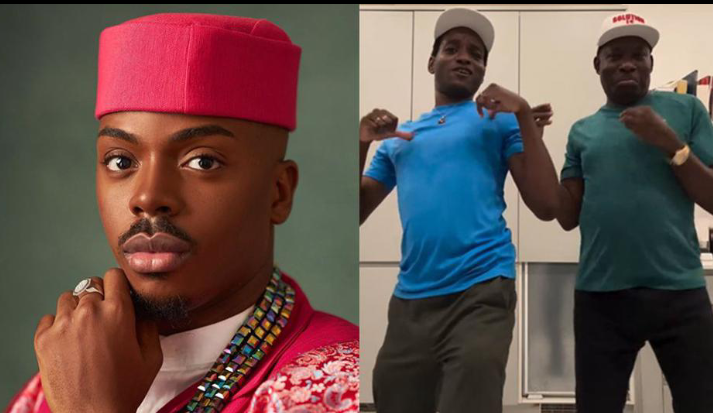
“There’s Love at Home”: Enioluwa Applauds Governor Soludo’s Viral Dance Video with Son Ozonna Amid Online Criticism

Nigerian influencer and fashion content creator, Enioluwa Adeoluwa, has stirred a wave of online conversation after he shared a heartfelt response to a now-viral video featuring Anambra State Governor, Charles Soludo, dancing cheerfully alongside his son, Ozonna Soludo. The clip, which spread rapidly across X (formerly Twitter) and Instagram, shows the duo sharing a lighthearted moment during a family occasion—smiling, dancing, and engaging with ease in front of the camera.
But what caught the attention of many was not just the video, but Enioluwa’s deeply emotional reaction to it. Taking to his verified X account, Enioluwa wrote: “They were bling him so much that his father must hate him. His father made a video with him for the same social media. I love it so much. There's love at home. Family is everything.” His post, though concise, encapsulated what many viewers felt but struggled to express: a father standing proudly beside his son, despite public criticism and online mockery.
Ozonna Soludo, who is known for his flamboyant fashion style and artistic expression, has frequently found himself at the center of social media controversy. A UK-based musician and self-described “alternative creative,” Ozonna has faced judgment and outright trolling from segments of Nigerian society who deem his lifestyle and appearance as unorthodox, particularly for the son of a conservative politician. His appearance—often colorful, edgy, and expressive—has led many to question everything from his masculinity to his values, with some cruelly speculating that his father must be embarrassed or even ashamed of him.
However, the recent video paints a radically different picture—one of unity, understanding, and, above all, love. Governor Soludo, a prominent figure in Nigerian politics and former Central Bank governor, did not merely stand beside his son; he danced with him, laughed with him, and in doing so, silently spoke volumes to millions of Nigerians watching.
Enioluwa’s commentary on the video did more than just cheer it on. It called out the hypocrisy of those who thrive on judgment and negativity, especially on social media platforms. His words highlighted a refreshing perspective on family acceptance, breaking away from the stereotypical image of African parents being stern, emotionally distant, or unyielding when their children do not conform to societal expectations. By saying “They were bling him so much that his father must hate him,” Enioluwa directly referenced the online bullying Ozonna had previously faced. But the rest of the sentence flipped the narrative: “His father made a video with him for the same social media.” That sentence alone is a powerful rebuttal to all who doubted that love could exist in families where the child’s lifestyle or choices challenge tradition.
Enioluwa’s emotional post quickly garnered support from fans and followers, many of whom resonated with the sentiment he expressed. Some wrote about their own strained relationships with parents due to their lifestyle, career choices, or identities, while others used the moment to call for greater understanding and compassion among Nigerian families.
The phrase “There’s love at home,” which Enioluwa used in his post, is now being echoed widely across social media. It has since become a subtle yet powerful clapback against the narrative that African parents cannot evolve, cannot be soft, or cannot stand by children who choose different paths. Enioluwa, who has himself built a reputation on authenticity, youthful optimism, and breaking gender norms, has consistently used his platform to uplift stories that celebrate individuality and family support.
The timing of the video and Enioluwa’s response also speaks to a broader shift in Nigerian society. As social media continues to democratize self-expression, more public figures are being forced to reckon with the reality that their personal lives are increasingly visible. This can be both a burden and a blessing. For the Soludo family, it became a moment of grace—a rare scene where politics stepped aside, and fatherhood took center stage.
Observers and political analysts have since weighed in on the governor’s decision to appear in such a casual and public setting with his son. While some praised him for showing emotional intelligence and open-mindedness, others suggested it was a calculated PR move to humanize his image. But those close to the Soludo family insist the interaction was genuine and unscripted.
“This is who he is at home,” said a family friend who preferred to remain anonymous. “He may be serious in public, but with his children, he’s playful, supportive, and deeply involved. He doesn’t just tolerate Ozonna—he celebrates him.”
Even if the governor had political motives, the impact of that video cannot be understated. In a country where many LGBTQ+ and nonconforming individuals face rejection, hostility, or even violence within their own families, such a public show of fatherly affection becomes more than just a viral moment—it becomes a cultural statement.
The video is also sparking renewed discussions about generational gaps, acceptance, and the evolving dynamics of parent-child relationships in Nigeria. For many young people, especially creatives and nontraditional professionals, parental support remains a distant dream. The lack of it often leads to depression, estrangement, or a permanent sense of rejection. But seeing someone like Governor Soludo dance with his son publicly is, for many, a glimmer of hope.
As for Ozonna, he has not publicly addressed the video or Enioluwa’s post. Known for keeping his personal life low-key despite his expressive public image, he continues to pursue his music career overseas. However, his recent collaboration with his father—intentional or spontaneous—may turn out to be the most impactful message he has ever sent to Nigerian youth: that it’s possible to be loved, accepted, and celebrated—even if you don’t fit the mold.
Meanwhile, Enioluwa remains a vital voice in the space between youth culture and social commentary. By choosing to amplify such a moment rather than letting it pass unnoticed, he reminds his audience that love is not just something you preach—it’s something you show, even when the world is watching.
In a digital world obsessed with conflict, Enioluwa's words and Governor Soludo’s actions remind us that healing can go viral too.


